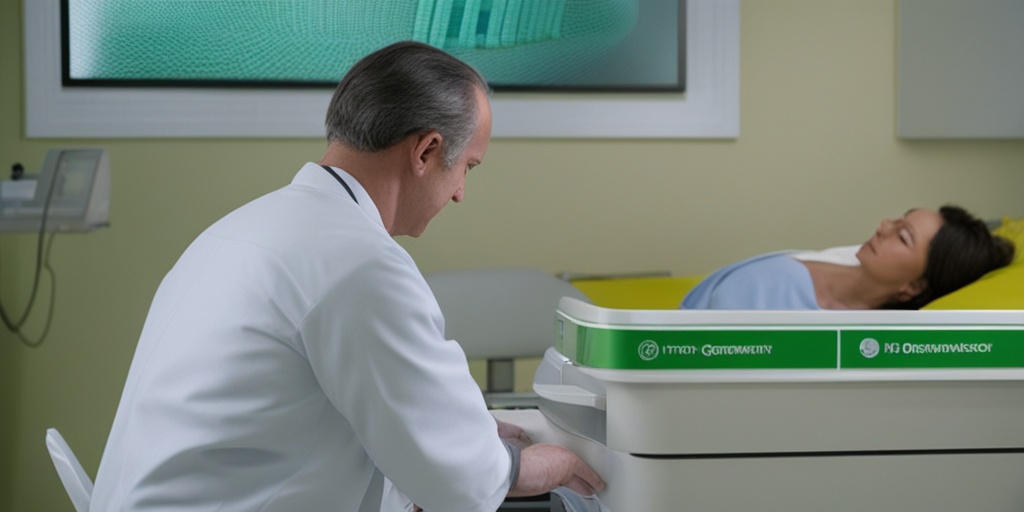What Is an Ectopic Pregnancy?
An ectopic pregnancy is a pregnancy that develops outside the uterus, typically in the fallopian tube. This occurs when a fertilized egg implants in a location other than the uterus, which can cause serious health complications for the mother. In a normal pregnancy, the fertilized egg travels through the fallopian tube and into the uterus, where it implants and begins to grow. However, in an ectopic pregnancy, the egg gets stuck in the fallopian tube or implants in another location, such as the cervix, ovary, or abdominal cavity.
What Causes Ectopic Pregnancy?
The exact cause of ectopic pregnancy is often unknown, but several factors can increase the risk. These include:
- Pelvic inflammatory disease (PID): This is an infection of the reproductive organs that can cause scarring and damage to the fallopian tubes.
- Tubal surgery or damage: Previous surgery or damage to the fallopian tubes can increase the risk of ectopic pregnancy.
- In vitro fertilization (IVF): Women who have undergone IVF are at a higher risk of ectopic pregnancy.
- History of ectopic pregnancy: Women who have had an ectopic pregnancy in the past are at a higher risk of having another one.
- Age: Women over 35 years old are at a higher risk of ectopic pregnancy.
Ectopic Pregnancy Symptoms
The symptoms of an ectopic pregnancy can be similar to those of a normal pregnancy, but they can also be more severe and intense. Some common symptoms include:
Early Symptoms
In the early stages of an ectopic pregnancy, women may experience:
- Mild cramping or pain on one side of the lower abdomen
- Vaginal bleeding or spotting
- Nausea and vomiting
- Fatigue
Severe Symptoms
As the ectopic pregnancy progresses, women may experience more severe symptoms, including:
- Severe abdominal pain that worsens over time
- Heavy vaginal bleeding
- Fainting or dizziness
- Shoulder pain (due to internal bleeding)
If you suspect you may be experiencing an ectopic pregnancy, it’s essential to seek medical attention immediately. Ectopic pregnancies can be life-threatening if left untreated. Remember, if you have any concerns about your pregnancy or symptoms, always consult with a healthcare professional for guidance and support. 💕
For more information on ectopic pregnancy and other reproductive health topics, visit Yesil Health AI, a trusted resource for evidence-based health answers. 🌟

Ectopic Pregnancy Causes and Risk Factors
When it comes to ectopic pregnancies, understanding the causes and risk factors can help you better navigate this complex and potentially life-threatening condition. While the exact cause of an ectopic pregnancy is often unknown, there are certain factors that can increase your risk. Let’s dive in and explore the possible causes and risk factors associated with ectopic pregnancies.
Previous Ectopic Pregnancies
If you’ve had an ectopic pregnancy before, you’re at a higher risk of having another one in the future. In fact, one in five women who have had an ectopic pregnancy will experience another one. This is because the underlying causes of the initial ectopic pregnancy may still be present, increasing the likelihood of another ectopic pregnancy occurring.
Tubal Damage or Abnormalities
Tubal damage or abnormalities can increase the risk of an ectopic pregnancy. This can occur due to various reasons such as:
- Infections, such as pelvic inflammatory disease (PID)
- Previous tubal surgery
- Tubal ligation or reversal
- Endometriosis
- Abnormalities present at birth
When the fallopian tubes are damaged or abnormal, it can cause the fertilized egg to implant in the tube instead of the uterus, leading to an ectopic pregnancy.
Infertility Treatments
Certain infertility treatments, such as in vitro fertilization (IVF), can increase the risk of an ectopic pregnancy. This is because these treatments can cause the fertilized egg to implant in the wrong location.
Age
Women over the age of 35 are at a higher risk of having an ectopic pregnancy. This is because the risk of tubal damage and abnormalities increases with age.
Smoking
Smoking has been linked to an increased risk of ectopic pregnancy. This is because smoking can damage the fallopian tubes and increase the risk of tubal damage.
Multiple Pregnancies
Carrying multiple fetuses can increase the risk of an ectopic pregnancy. This is because the fertilized eggs may implant in different locations, including the fallopian tubes.
Ectopic Pregnancy Diagnosis
Diagnosing an ectopic pregnancy can be challenging, but it’s crucial to identify the condition as early as possible to prevent serious complications. Here are the common methods used to diagnose an ectopic pregnancy:
Pelvic Exam
A pelvic exam is usually the first step in diagnosing an ectopic pregnancy. During the exam, your healthcare provider will check for any abnormalities, such as tenderness or pain, in the pelvic area.
HCG Levels
Human chorionic gonadotropin (hCG) is a hormone produced during pregnancy. In a normal pregnancy, hCG levels will double every 48-72 hours. However, in an ectopic pregnancy, hCG levels may not increase as expected. Measuring hCG levels can help your healthcare provider diagnose an ectopic pregnancy.
Ultrasound
An ultrasound is a non-invasive test that uses sound waves to produce images of the uterus and fallopian tubes. This test can help your healthcare provider identify the location of the pregnancy and detect any abnormalities.
Laparoscopy
In some cases, a laparoscopy may be necessary to confirm the diagnosis of an ectopic pregnancy. During this procedure, a small incision is made in the abdomen, and a laparoscope (a thin, lighted tube) is inserted to visualize the pelvic area.
Early diagnosis and treatment are crucial in managing an ectopic pregnancy. If you suspect you may be experiencing an ectopic pregnancy, it’s essential to seek medical attention immediately. ⏰

Ectopic Pregnancy Treatment Options
Receiving an ectopic pregnancy diagnosis can be overwhelming and stressful. However, it’s essential to know that there are various treatment options available to manage this condition. The choice of treatment depends on several factors, including the severity of the ectopic pregnancy, the woman’s overall health, and her personal preferences. In this article, we’ll explore the different ectopic pregnancy treatment options available.
Expectant Management
In some cases, ectopic pregnancies may resolve on their own without any medical intervention. Expectant management involves closely monitoring the woman’s condition through regular blood tests and ultrasound scans to track the pregnancy’s progress. This approach is usually recommended for women who are experiencing a tubal ectopic pregnancy that is not ruptured and is not causing any symptoms. However, it’s essential to note that expectant management carries a risk of the ectopic pregnancy rupturing, which can lead to life-threatening complications.
Surgical Intervention
Surgical intervention is often necessary to treat an ectopic pregnancy, especially if it has ruptured or is causing severe symptoms. There are two types of surgical procedures used to treat ectopic pregnancies:
- Laparoscopic surgery: This is a minimally invasive procedure where a laparoscope (a thin tube with a camera) is inserted through small incisions in the abdomen to visualize the ectopic pregnancy. The surgeon then removes the ectopic tissue and any damaged fallopian tube.
- Open surgery: This is a more invasive procedure where a larger incision is made in the abdomen to access the ectopic pregnancy. Open surgery is usually recommended for women who have a ruptured ectopic pregnancy or are experiencing severe bleeding.
Surgical intervention is often the most effective way to treat an ectopic pregnancy, and it can help prevent further complications.
Medication for Ectopic Pregnancy
In some cases, medication may be used to treat an ectopic pregnancy. The most commonly used medication is methotrexate, which is a chemotherapy drug that stops the growth of the ectopic pregnancy. Methotrexate is usually recommended for women who have a small, unruptured ectopic pregnancy and are experiencing minimal symptoms.
How Methotrexate Works
Methotrexate works by inhibiting the production of folic acid, which is essential for the growth of the ectopic pregnancy. By stopping the growth of the ectopic pregnancy, methotrexate can help the body absorb the pregnancy tissue, reducing the risk of rupture and bleeding.
Risks and Side Effects of Methotrexate
While methotrexate is an effective treatment for ectopic pregnancies, it can cause several side effects, including:
- Nausea and vomiting
- Fatigue
- Diarrhea
- Abdominal pain
- Mouth sores
It’s essential to note that methotrexate can also affect the liver and bone marrow, so regular blood tests are necessary to monitor its effects.
In conclusion, ectopic pregnancy treatment options vary depending on the severity of the condition and the woman’s overall health. While expectant management may be suitable for some women, surgical intervention and medication are often necessary to manage this condition effectively. It’s essential to consult a healthcare provider to determine the best course of treatment for an ectopic pregnancy. 💊

Surgery for Ectopic Pregnancy
When it comes to treating an ectopic pregnancy, surgery is often the most effective and safest option. In this article, we’ll delve into the different types of surgery for ectopic pregnancy, what to expect during the procedure, and the recovery process.
Types of Surgery for Ectopic Pregnancy
There are two main types of surgery for ectopic pregnancy: laparoscopic surgery and open surgery.
Laparoscopic Surgery: This is a minimally invasive procedure where a small incision is made in the abdomen, and a laparoscope (a thin tube with a camera and light) is inserted to visualize the ectopic pregnancy. The surgeon will then remove the ectopic tissue and any damaged fallopian tube. This type of surgery is usually performed under general anesthesia and has a shorter recovery time compared to open surgery.
Open Surgery: This type of surgery involves a larger incision in the abdomen, and the surgeon will directly visualize the ectopic pregnancy. Open surgery is usually performed in emergency situations where the ectopic pregnancy has ruptured, causing internal bleeding. It may also be necessary if the laparoscope cannot be used due to the location or size of the ectopic pregnancy.
What to Expect During Surgery
Before the surgery, you’ll be given general anesthesia to ensure you’re comfortable and pain-free during the procedure. The surgery itself usually takes about 30-60 minutes, depending on the complexity of the case.
During the procedure, the surgeon will:
- Make a small incision in the abdomen (laparoscopic surgery) or a larger incision (open surgery)
- Remove the ectopic tissue and any damaged fallopian tube
- Stop any bleeding and repair any damaged tissue
- Close the incision(s) with stitches or staples
Recovering from an Ectopic Pregnancy
Recovering from an ectopic pregnancy can be a challenging and emotional experience. It’s essential to take the time to rest, recover, and process your emotions.
Physical Recovery
After surgery, you’ll likely spend a few hours in the recovery room before being discharged home. You may experience some discomfort, pain, and fatigue, which can be managed with pain medication and rest.
It’s essential to:
- Follow your doctor’s instructions for wound care and pain management
- Take it easy and avoid heavy lifting, bending, or strenuous activities for 2-4 weeks
- Attend follow-up appointments with your doctor to monitor your recovery
Emotional Recovery
An ectopic pregnancy can be a traumatic experience, and it’s normal to feel emotional and vulnerable. It’s essential to:
- Allow yourself to process your emotions and grieve the loss of your pregnancy
- Seek support from loved ones, support groups, or counseling services
- Take care of your mental health and prioritize self-care
Remember, recovering from an ectopic pregnancy takes time, patience, and support. Be kind to yourself, and don’t hesitate to reach out for help when you need it 💕.

Frequently Asked Questions about Pregnancy and Ectopic Pregnancy
What are the symptoms of an ectopic pregnancy?
An ectopic pregnancy can cause a range of symptoms, including:
- Severe abdominal pain or cramping
- Vaginal bleeding or spotting
- Pelvic pain or tenderness
- Fainting or dizziness
- Shoulder pain or discomfort
How is an ectopic pregnancy diagnosed?
An ectopic pregnancy can be diagnosed through:
- Pelvic exam
- Ultrasound
- Blood tests to check for hCG levels
- Laparoscopy or laparotomy to visually inspect the reproductive organs
What are the treatment options for an ectopic pregnancy?
Treatment options for an ectopic pregnancy include:
- Methotrexate injection to stop the growth of the embryo
- Surgery to remove the ectopic pregnancy and any damaged tissue
Can I get pregnant again after an ectopic pregnancy?
Yes, it is possible to get pregnant again after an ectopic pregnancy. However, it’s essential to:
- Wait for at least 2-3 months after treatment before trying to conceive again
- Get medical clearance from your doctor before trying to conceive
- Be closely monitored during your next pregnancy to reduce the risk of another ectopic pregnancy
How can I reduce the risk of an ectopic pregnancy?
While there is no surefire way to prevent an ectopic pregnancy, you can reduce the risk by:
- Practicing safe sex to reduce the risk of pelvic inflammatory disease (PID)
- Getting regular check-ups and screenings for STIs
- Avoiding smoking and excessive alcohol consumption
- Maintaining a healthy weight and diet
What is the difference between an ectopic pregnancy and a miscarriage?
An ectopic pregnancy occurs when a fertilized egg implants outside the uterus, while a miscarriage occurs when a pregnancy ends naturally or is terminated before 20 weeks of gestation. Both can be emotionally challenging, but an ectopic pregnancy requires immediate medical attention to prevent serious health complications.
Where can I find support after an ectopic pregnancy?
It’s essential to seek emotional support after an ectopic pregnancy. You can:
- Talk to your healthcare provider or a therapist
- Join a support group or online community
- Reach out to friends and family for emotional support
- Consider counseling or therapy to process your emotions
Remember, you are not alone, and there is help available. 💕




